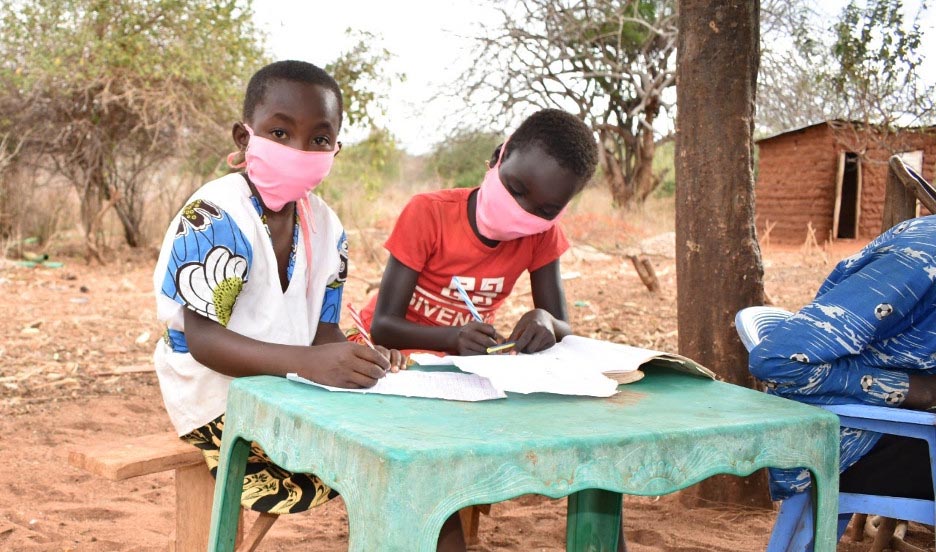
Nyansapo, the winners of the 2020 Nittany AI Challenge, conducted a literacy boot camp in Kenya in August 2020. The Nyansapo team has been awarded $10,000 to continue to develop its app that is designed to increase literacy rates in African countries. IMAGE: NYANSAPO
App developed by Penn State students is central to literacy boot camp in Kenya
10/21/2020
UNIVERSITY PARK, Pa. — Nyansapo, an app developed by Penn State students, uses artificial intelligence (AI) to assist children in learning literacy skills. The app was launched in August during a 10-day boot camp in Kenya where reported results showed participants increased their level of literacy.
Tanish Rastogi is one of the students who developed Nyansapo. He is a sophomore majoring in computer science in the College of Engineering at Penn State. Rastogi said literacy rates in Kenya are low due in part to a 40-to-one, student-to-teacher ratio in the classroom.
“Because of this disparity, many students do not develop essential literacy skills, and due to the COVID-19 pandemic, students have been out of school since March and their day-to-day lives have been completely disrupted. This boot camp was an opportunity to present a learning experience in a safe environment,” Rastogi said. “The aim of Nyansapo is to help improve literacy levels of children through community-based education, so they will be more prepared for classroom education. It is an interactive, child-friendly mobile app that uses speech-to-text and natural language processing to assess and collect valuable data from app users to inform teachers about their literacy levels.”
Nyansapo was developed during the 2020 Nittany AI Challenge, a yearlong competition facilitated by the Nittany AI Alliance, a Penn State Outreach service. The challenge tasked participants to use AI for good to address problems within the areas of education, health, humanitarian challenges and the environment. Team members include Rastogi, Edward Amoah, Rhea Baweja, Ritik Parmar, Benson Wainaina, Jason Wang and Kushagra Jaiswal — all students in the College of Engineering at Penn State. Nyansapo was selected as one of the winners of the challenge.
“As a team, we developed the mobile app while working together from all over the world during the COVID-19 pandemic. From Singapore to Kenya to the United States, development consisted of at least 50 Zoom meetings, hundreds of WhatsApp messages, Google documents, as well as sharing code and app builds,” Rastogi said. “This boot camp would not have been possible without the support of the Nittany AI Alliance and the Penn State Humanitarian Engineering and Social Entrepreneurship (HESE) program. One of the major goals for the boot camp was to test the Nyansapo app, so that we can find some of its limitations and fix them. Nyansapo is a project that lives at the intersection of education and technology. For most of the teachers and students, this is the first time that technology and learning have been integrated.”
Rastogi said that during the boot camp, 80 hours of teaching sessions were conducted. All the teachers worked with an average of 13 primary school learners between the ages of 9 and 17 years. The children were grouped according to their learning levels in letter, word, paragraph and story. The sessions allowed for group and individual learning.
“The learner’s progress with the Nyansapo app was tracked before the start of the program, after 10 hours of instruction, and at the end of the boot camp,” Rastogi said. “The app provided teachers with useful information, like commonly missed words, to help teachers prepare effectively for the training sessions. The sessions involved simple activities and materials appropriate for different literacy levels. At the end of the boot camp, about 96% of the kids involved in the program improved by at least one level.”
Rastogi said the team is planning to hold additional boot camps in the future. Learn more by following Nyansapo on social media.
Preparations for the 2021 Nittany AI Challenge are already underway. Students can learn how to form a team and faculty can learn how to mentor a team by visiting the Nittany AI Alliance website.



